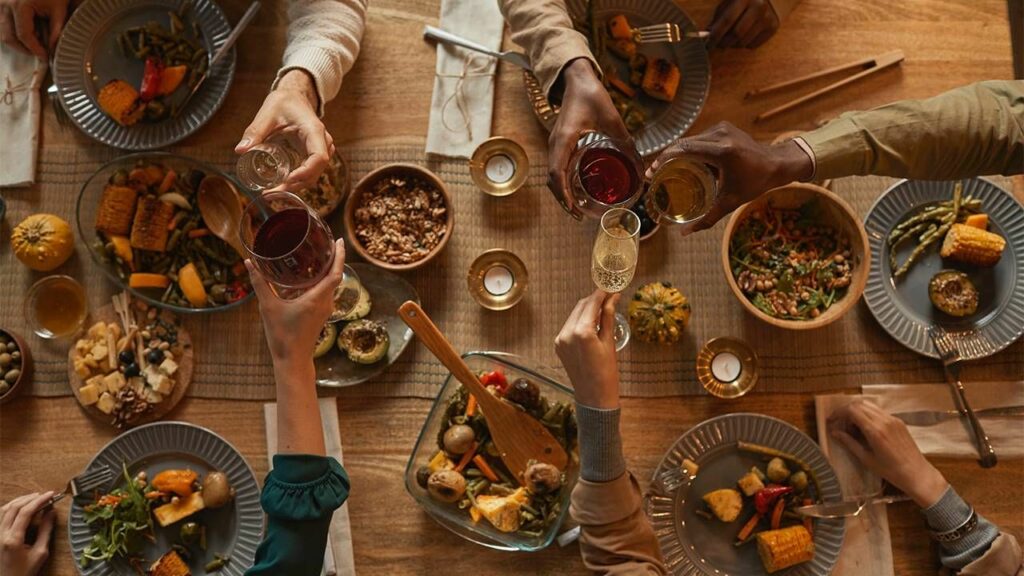
Blog post
Prioritizing Mental Health as a Universal Human Right
By: Neltada Charlemagne, DNP, APRN, PMHNP-BC, PHN, BHC
There may be sadness at the loss of traditions, but it can also be an opportunity to find meaning in new experiences
This article first appeared on Next Avenue.
When my three kids were little, every year, we celebrated Chanukah on a Sunday in December. My mother would make homemade potato latkes using my grandmother’s recipe. The first few years, my two younger brothers were single, but over the years their spouses and children joined in the festivities. In 2015, there were 17 of us around the table.

But as my kids got older, it became harder to find a day that everyone in the family could get together. Someone was always missing, and it wasn’t the same. When we had to cancel the party in 2019 due to a snowstorm, I was secretly relieved. Then the following year, the pandemic made it impossible for us to all gather safely.
I didn’t know that the last annual Chanukah party was, in fact, the last time we would celebrate the holiday in that format and that our long-held family tradition was ending.
The definition of tradition is “the transmission of customs or beliefs from generation to generation or the fact of being passed on this way.”
“By having our tradition, we are saying, ‘This is how our family does things and it creates a sense of belonging.'”
Traditions provide a connection for families or friends. Rachna Buxani-Mirpuri, a mental health counselor in Pinecrest, Fla., explains: “Traditions are a way of families passing on their identity and cultural values. By having our tradition, we are saying, ‘This is how our family does things and it creates a sense of belonging.'”
Often, family traditions are associated with religion such as lighting candles for Advent or oil lamps for Diwali.
The Thanksgiving through New Year’s holiday season is usually filled with lots of traditions. “Traditions create cohesion,” says Dr. Gail Saltz, associate professor of psychiatry at the New York Presbyterian Hospital, Weill-Cornell Medical College and host of the “How Can I Help?” podcast from iHeartRadio. “They illustrate that we are a part of each other’s lives.”
Natalie Christine Dattilo, a Boston-based clinical health psychologist and mental wellness expert, adds, “Traditions anchor us. They provide familiarity and predictability, both of which have been in short supply over the past year and a half.”
Having a family tradition can give people a sense of comfort. I liked knowing that there was a plan in place for how we would celebrate the holiday. I didn’t have to worry about when the whole extended family would be together, because I knew there was a date set in advance.
“Friends and family make up the fabric of our life. They help shape our identity and traditions are part of this narrative,” says Saltz. “Traditions become the scaffold of who we are, and what and who is important to us.”
There are many reasons traditions end. It can be something definitive (a death, divorce, a move) or something less concrete. Or a tradition may run its course and not work over time as lives change or people get older. Sometimes a tradition ends because the joy it once brought has faded.
Regardless of why a tradition ends, there is a feeling of loss, Saltz says.
“There is a sadness when we lose a tradition. We realize that life doesn’t stand still. It may bring to light that there is more life behind you than in front of you. If a tradition ends because of a person’s death, it can remind you of your own immortality,” she explains.
Just because a tradition ends doesn’t mean it wasn’t meaningful. It’s okay to have mixed feelings. You may be grateful for the good memories; sad that the tradition has ended, but also happy that you can move forward in a different way.
Just because you miss the tradition of making pancakes with your kids on Christmas morning does not mean you aren’t also happy that your kids are grown and have children of their own to share the day with now.
When a tradition ends, Saltz suggests people give themselves permission and time to grieve. Try not to get bogged down by absolutes.
“Rather than saying, ‘We will never have Christmas dinner again,’ which can be overwhelming, take it one step (or year) at a time,” she says.
“If the tradition no longer brings you joy, explain that to your friends and family.”
If you are the one deciding to put an end to a tradition, don’t feel guilty.
“Taking care of your own emotional and mental health is important. If you feel burnt out and push yourself to continue a tradition, it can lead to resentment or outbursts,” Buxani-Mirpuri says.
Rather than focusing on the tradition itself, look at the meaning behind it.
“The idea behind a tradition is about connection,” Buxani-Mirpuri says. “But traditions can be confining and can become exhausting if you are doing them year after year. If the tradition no longer brings you joy, explain that to your friends and family. Let them know that you still want to connect with them, but it a new way.”
The end of a tradition can also give people a chance to make a needed change.
“Letting go of old traditions doesn’t have to be somber,” says Dattilo, “It can provide an opportunity to clarify your family’s values and create new traditions that are in better alignment with those.”
Michigan resident Sandy Jones used to host a holiday dinner for 20 people. She remembers buying filets, and expensive desserts, in local specialty stores.
These days, her holidays are smaller — sometimes just Jones and her husband.
“I still do a tree, but now it’s all white with my mother’s ornaments rather than the fun colors the kids loved,” she says. “Admittedly, the first year was sad. But now I make it special because the two of us deserve it.”
Dattilo suggests removing the word “should” from your vocabulary when it comes to family traditions. “Telling yourself it ‘should’ be a certain way, just because it always has, may feel hollow, forced, and inauthentic,” she notes.
Years ago, a friend lost her beloved father a few months before the holidays. She felt she should have her big annual Christmas Eve dinner because she didn’t want to disappoint anyone. But her heart wasn’t in it.
Her husband suggested that just for that year they skip the dinner and go on a family vacation. They had such a good time that decades later, traveling for Christmas remains their new holiday tradition.
As for my family, I hope to reinvent the annual Chanukah party this year and celebrate with my husband, three grown children, plus any friends they want to invite. While the guest list will be different and the crowd smaller, the menu will remain the same, including my grandmother’s potato latkes.
It will be the start of a new tradition, but with the delicious connection to the old tradition.


By: Neltada Charlemagne, DNP, APRN, PMHNP-BC, PHN, BHC

Older adults can safeguard themselves from the physical, mental and emotional toll of unexpected medical costs.

Optum Care Network – Monarch has teamed up with Landmark to deliver in-home medical care to members with multiple chronic conditions.